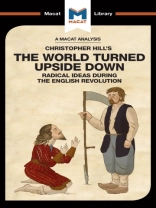Few works of history have succeeded so completely in forcing their readers to take a fresh look at the evidence as Christopher Hill”s The World Turned Upside Down – and that achievement is rooted firmly in Hill”s exceptional problem-solving skills.
Traditional interpretations of the English Civil War concentrated heavily on a top-down analysis of the doings of king and parliament. Hill looked at ‘history from below, ’ focusing instead on the ways in which the people of Britain saw the society they lived in and nurtured hopes for a better future. Failing to understand these factors – and the impact they had on the origins and outcomes of the wars of the 1640s – means failing to understand the historical period. In this sense, Hill”s influential work is a great example of the problem-solving skills of asking productive questions and generating alternative possibilities. It forced a generation of historians to re-evaluate the things they thought they knew about a key pivot point in British history – and went on to influence the generations that came after them.












